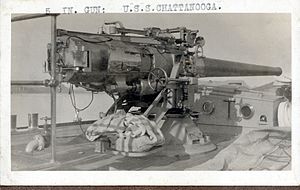5-inch/50-caliber gun
 Chattanooga, 5"/50 caliber deck gun, probably port side forward. | |
| Type |
|
| Place of origin | United States |
| Service history | |
| In service | 1904 |
| Used by | |
| Wars | |
| Production history | |
| Designer | Bureau of Ordnance |
| Designed | 1900 |
| Manufacturer | U.S. Naval Gun Factory |
| No. built |
|
| Variants | Mark 5 Mods 0–3, Mark 6 Mods 0–2 |
| Specifications | |
| Mass |
|
| Length | Marks 5 and 6: 255.65 in (6,494 mm) |
| Barrel length | Marks 5 and 6: 250 in (6,400 mm) bore (50 calibers) |
| Shell |
|
| Caliber | 5 in (127 mm) |
| Elevation |
|
| Traverse | −150° to +150° |
| Rate of fire | 6–8 rounds per minute |
| Muzzle velocity |
|
| Maximum firing range | 19,000 yd (17,000 m) at 25.3° elevation |
The 5"/50 caliber gun (spoken "five-inch-fifty-caliber") was the first long barrel 5-inch (127 mm) gun of the United States Navy and was used in the secondary batteries of the early Delaware-class dreadnought battleships, various protected cruisers, and scout cruisers. They were also refitted in the secondary batteries of the armored cruiser New York and the New Orleans-class protected cruisers. They were later used on cargo ships, store ships and unclassified auxiliaries during World War II as well as in emergency coastal defense batteries.[1]
Design
The Mark 5, Nos. 200 – 286, was a 50 caliber naval gun of a simplified construction by combining the breech piece along with the chase hoop into one long tube that was shrunk on from the muzzle. Mod 1 was a Mod 0 gun that was relined with a conical nickel-steel liner and an additional gun-steel chase hoop that extended to the muzzle that was secured by a nickel-steel locking ring. Mod 2, gun No. 280, had a slightly different liner with Mod 3, gun No. 245, was a Mod 0 gun with its gun-steel tube replaced with a nickel-steel tube with a gun-steel chase hoop added that extended all the way to the muzzle. The Mod 3 gun had a longer chase hoop and shorter jacket compare to Mods 1 and 2.[1][2]
The Mark 6, gun Nos. 293 – 356, was the bag-ammunition equivalent to the Mark 5 gun. Mod 0, Nos. 323 – 356, had a single jacket constructed of nickel-steel, that replaced the jacket, chase hoop and locking ring of the Mark 5. Mod 1, Nos. 293 – 306 and 308, was built of gun-steel with a chamber of a different design with some external differences to fit it onto different mountings. The Mod 2, Nos. 307 and 309 – 322, had the same chamber as the Mod 0 but was otherwise almost identical to the Mod 1.[1][2]
Naval Service
| Ship | Gun Installed | Gun Mount |
|---|---|---|
| USS Delaware (BB-28) | Mark 6 Mod 0: 14 × 5"/50 caliber (Nos. 343–356) | Mark 9 and 12 |
| USS North Dakota (BB-29) | Mark 6 Mod 0: 14 × 5"/50 caliber (Nos. 329–342) | Mark 9 and 12 |
| USS New York (ACR-2) | Mark 6 Mod 1: 10 × 5"/50 caliber (Nos. 295–304) (1907 refit) | Unknown |
| USS Denver (C-14) | Mark 5: 10 × 5"/50 caliber | Unknown |
| USS Des Moines (C-15) | Mark 5: 10 × 5"/50 caliber | Unknown |
| USS Chattanooga (C-16) | Mark 5: 10 × 5"/50 caliber | Unknown |
| USS Galveston (C-17) | Mark 5: 10 × 5"/50 caliber | Unknown |
| USS Tacoma (C-18) | Mark 5: 10 × 5"/50 caliber | Unknown |
| USS Cleveland (C-19) | Mark 5: 10 × 5"/50 caliber | Unknown |
| USS Chester (CS-1) | Mark 6 Mod 0: 2 × 5"/50 caliber (Nos. 323–324) | Unknown |
| USS Birmingham (CS-2) | Mark 6 Mod 0: 2 × 5"/50 caliber (Nos. 325–326) | Unknown |
| USS Salem (CS-3) | Mark 6 Mod 0: 2 × 5"/50 caliber (Nos. 327–328) | Unknown |
| USS New Orleans (CL-22) | Mark 5: 10 × 5"/50 caliber (1904 and 1907 refits) | Unknown |
| USS Albany (CL-23) | Mark 5: 10 × 5"/50 caliber (1904 and 1907 refits) | Unknown |
The 5-inch/50 caliber gun was also used on cargo ships, store ships and unclassified auxiliaries during World War II.[1]
Notes
- ^ a b Friedman 2011, p. 184–185.
References
- Friedman, Norman (2011). Naval Weapons of World War One. Seaforth Publishing. ISBN 978-1-84832-100-7.
- "United States of America 5"/50 (12.7 cm) Mark 5 and Mark 6". Navweaps. 12 February 2008. Retrieved 20 October 2016.
